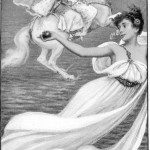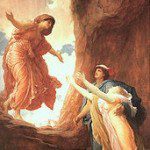
The Modern Pagan movement is a result of a complex series of events spread throughout the history of Western Culture. Indeed, it is difficult to pinpoint a moment when some scrap of Paganism was not, in some way present and influential. What I have an interest in is figuring out where Paganism in its modern form came from and why. For these purposes alone, it is necessary to have a proper understanding of the word Pagan and its usage. Furthermore, I believe that an understanding of the development of the movement–as well as the usage of the word Pagan–will help us grasp what constitutes Pagan understanding and Pagan worship in the modern era.
I believe that at least part of the problem is that “[a] large proportion of Pagans today are unaware of the sources of their religion and do not tend to delve particularly deeply into its origins” (Tully, 2011, p. 98). For a set of religions largely without clergy, Paganism more has essentially failed to provide its adherents with critical thinking skills, an understanding of proper research methods and data analysis, and even a basic theological education. As a result, and I believe in conjunction with the heavy reliance on personal gnosis (which John Halstead explored quite admirably), many Pagans simply do not know how to discern their own desires from the divine, the effect that their own personal histories have had on their religious development, the role that Paganism plays in the larger culture, and the theological ramifications of their practices and ideas. Paganism does not exist in a vacuum, but is and always has been effected by the larger culture. Indeed, the history of the development of modern Paganism shows just how much it has been shaped by forces around it.
Modern Paganism did not emerge ex nihilo, nor is it any accident that Pagan was the word that came to describe this religious movement. Pagan thought, in some form, has nearly always been a part of Western Culture. Even at the height of the Catholic Church’s power, Classical Antiquity provided the cornerstone of a proper education. Indeed, the Ancient Greek and Roman philosophers and poets played a heavy role in the cultural development of Europe and America.
Dante’s Divine Comedy, in the high Middle Ages, enunciated in full development the attitude towards the classical pagan world which was to obtain for the next seven centuries; that it should be admired and loved, and that the triumph of Christianity had served to perfect it. (Hutton, 1999, p. 12)
While the presence of Pagan thought was heavily glossed with Christian ethics and morality, and viewed as largely incomplete until the rise of Christianity, it was revered and loved. The Italian Renaissance demonstrated over and over again the fascination that Western Culture has had with the themes and characters of Greek and Roman mythology, even while at the same time insisting on a purely Christian interpretation.
It was not until later, during a movement that many modern Pagans deride and attack, that Pagan thought began to escape from the shadow of Christianity.
…, the Enlightenment did contribute themes which would be incorporated into a genuine modern paganism. It set up an antithesis between Christianity and the other patriarchal monotheisms and the religions of nature which had preceded them, and regarded the former as a disaster. It identified alienation as the central problem facing the human self, and a return to nature as a rediscovery of true humanity. It also blamed that alienation at least partly upon authoritarian and hierarchical social structure, which denied the autonomy of the individual and self-worth. It aimed to abolish or universalize the priesthood, it recognized no scripture, and it located the source of truth in the human being. It did so, moreover, by turning to pagan Greek and Roman texts for inspiration and example. (Hutton, 1999, p. 21-22)
While the Enlightenment was generally hostile toward religion, it also cleared the ground for the development of Modern Paganism and provided some of the necessary tools. It was not until the Enlightenment that your average person would be thought of as autonomous and capable of exercising free will. The political and cultural shifts that we refer to as the Enlightenment signaled the decline of monarchies and the emergence, once more, of personal choice and political freedom. Combined with the Protestant Reformation, the Enlightenment marked a change in the way that Western Culture conceived of authority, both temporal and divine, and began the process of shifting authority into the private individual and out of the hands of the state and church.
Is it really necessary to go back this far in order to gain a proper understanding of Paganism? Honestly, I believe it is, if for no other reason than to demonstrate that while Modern Paganism is a very recent development, its roots stretch back far into our collective history. Greece and Rome provided the intellectual cornerstone for the development of Western culture, and we as modern Pagans must be aware that there has always been a hint of the Pagan around us. Even though it has only been recently that people have once again in large numbers turned to the Gods of the ancients and the Spirits of the land looking for religion, we have never been entirely free of their influence. Western Culture has been steeped in Classical Antiquity and so it seems as though it was only a matter of time before the allure of our ancestors became strong enough to draw us back.
Of course, this is barely scratching the surface, and there is much more work to do uncovering the history and development of the Pagan movement. However, I feel that it is important to understand that our history as Pagans is bound up in a larger history, and in fact has been made possible by other, larger movements that changed Western culture as a whole. Modern Paganism is just one of a complex variety of movements that was possible by the Enlightenment, for example, and it is necessary that we understand how we collectively arrived at a place where Paganism could once more become a viable way of experiencing the world. This post marks the first in a series exploring the larger cultural movements that both laid the groundwork for and shaped modern Paganism.
References:
Hutton, R. (1999). The triumph of the moon: A history of modern pagan witchcraft. New York: Oxford University Press Inc.
Tully, C. J. (2011). Researching the past is a foreign country: Cognitive dissonance as a response by practitioner pagans to academic research on the history of pagan religions. The Pomegranate, 13(1), 98-105. doi: 10.1558/pome.v13i1.98
Syncretic Electric is published on alternate Fridays. Subscribe via RSS or e-mail!













